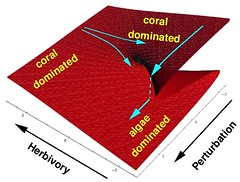In the previous post I promised to explain the lengthy answer to the Kevin Bacon riddle posed in the first post. Here's a start...
Let's take a short trip through food webs, ecosystem collapses, and the bottom-up approach to making new scientists. We'll begin by looking at tropical coral reefs, the most species-rich ecosystems in modern oceans. Coral reef communities are important reservoirs of biodiversity, and they are of extreme economic importance to many human communities because of tourism and fisheries. They are also one of the most critically endangered ocean systems, and in the last couple of decades we have witnessed the rather sudden transition of many of these systems from diverse, coral-dominated systems, to species-poor, algae-dominated systems. These transitions have been attributed to a number of factors, most notably overfishing of high trophic level species, pollution and pollution-driven diseases, and most recently, ocean warming and acidification because of global warming. But as many scientists have documented, reefs as we know them today are mere shadows of what they were hundreds, and perhaps even thousands of years ago. The footprint of human impact is really a long highway. There is no doubt that transitions are occurring today though, because we are witnessing them. Why now?
Take a look at the heuristic image. This is known mathematically as a catastrophe manifold, and it's a very useful way to visualize what's happened recently to some Caribbean reefs. Those reefs, which historically have withstood years of battering hurricanes, are now vulnerable to severe storm damage. The major reason is that the removal of large herbivorous fish, grazers of algae, allows large algae to take over large areas of the reef after a storm has passed through. The algae reproduce and spread much more rapidly than do the coral. Under normal circumstances, suppression of the algae by the fish allow the coral to thrive and construct the important reef habitat. The important take home messages for us are:
- 1. The transitions from coral to algae dominance are the result of cumulative impacts, and though the state of the system appears to be stable, an erosion of its internal stability is taking place.
- 2. When a transition occurs, it can be quite sudden; it's a surprise! And indeed, these transitions tend to occur within a few years.
Now the precise manner in which this all happens is of great interest to answering the riddle of Mr. Bacon and science education. It all has to do with networks of interaction and relationships, and the ways in which you can spread, or cascade, through those networks. I'll illustrate this in the next post by yanking you back into the past, way back (250+ million years), to one of Earth's most interesting times, the Late Permian.
In the meantime, take a look at some of my recent work on coral reefs. You can also read a rant about networks here.
